初中反义疑问句专题讲解
九年级反义疑问句知识点
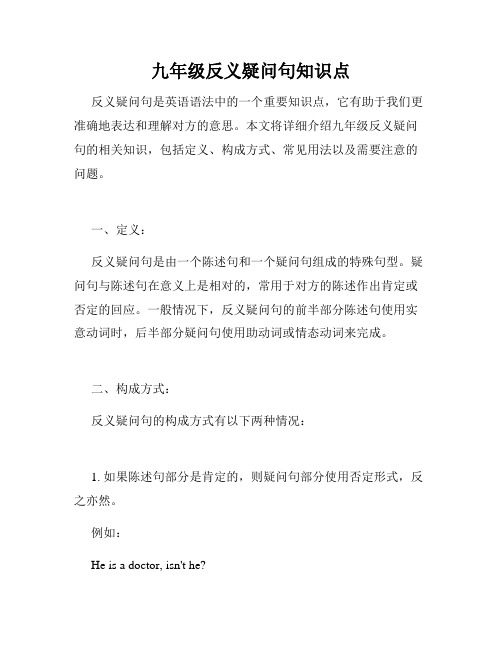
九年级反义疑问句知识点反义疑问句是英语语法中的一个重要知识点,它有助于我们更准确地表达和理解对方的意思。
本文将详细介绍九年级反义疑问句的相关知识,包括定义、构成方式、常见用法以及需要注意的问题。
一、定义:反义疑问句是由一个陈述句和一个疑问句组成的特殊句型。
疑问句与陈述句在意义上是相对的,常用于对方的陈述作出肯定或否定的回应。
一般情况下,反义疑问句的前半部分陈述句使用实意动词时,后半部分疑问句使用助动词或情态动词来完成。
二、构成方式:反义疑问句的构成方式有以下两种情况:1. 如果陈述句部分是肯定的,则疑问句部分使用否定形式,反之亦然。
例如:He is a doctor, isn't he?He isn't a doctor, is he?2. 如果陈述句部分使用助动词或情态动词,疑问句部分使用主要动词。
例如:You can swim, can't you?You can't swim, can you?三、常见用法:九年级阶段,学生需要掌握反义疑问句的常见用法,以下是一些例子:1. 表示请求或征求对方的意见或确认:You will come to the party, won't you?Let's go for a walk, shall we?2. 表示对方的推测并确认:She is your sister, isn't she?3. 表示对方的意见并征求同意或否定:You don't mind if I sit here, do you?4. 表示对方的实际情况并征求确认:You have finished your homework, haven't you?四、需要注意的问题:在使用反义疑问句时,需要注意以下几个问题:1. 人称和时态的一致性:主语的人称和时态需与疑问句的主语相对应,否则会造成语法错误。
例如:She is a doctor, isn't they?(错误)She is a doctor, isn't she?(正确)2. 答案的选择:对于反义疑问句,回答要根据前半部分陈述句而定。
初中英语反义疑问句详细讲解--整合

反义疑问句一、英文中的反意疑问句。
1、什么是反意疑问句英语中,反意疑问句是由陈述句和附在其后的附加疑问句组成。
其中附加疑问句是对陈述句所说的事实或观点提出疑问,起证实作用,一般用于证实说话者所说的事实或观点。
(表示说话者对某事有一定看法,但又不完全确定,需要对方加以证实。
)翻译为“是吗”2。
反意疑问句的回答,回答时,如果情况属实,用Yes加上反问句的倒装肯定句;若果情况不属实,则用No加上反问句的倒装否定句。
例如You were moved by your students, weren’t you?情况属实:Yes, I were. ?was情况不属实:No, I weren't。
注意事项:附加问句的主语应与陈述句的主语保持一致,且只能用人称代词替代。
如:You come from Beijing, don’t you?你来自北京,是不是?The students in Grade One won’t go to the park,will they? 一年级的学生不去公园了,是吗?二、反意疑问句中问句部分的动词与陈述部分的动词在语气上成相反的对应关系,即:肯定+否定?否定+肯定?如:You can’t do it, can you?你不能做它,是吗?They are very late for the meeting,aren’t they? 他们开会迟到了,是吗?三.当陈述句中含有be动词,助动词,或是情态动词时,反问句部分由这些词加上主语人称代词构成,Be动词包括:am, is,are,was,were助动词有:do,does, did, have(用在完成时), has(用在完成时)等情态动词有:can,could, may,might, must,will, would, shall, shoul例如:She is a lovely girl,isn’t she? 她是一个可爱的女孩,是吗?He will go home, won't he? 他要回家了,是吗?She doesn't like to eat popcorn,does she? 她不喜欢吃爆米花,是吗?The baby won’t sleep early,will it?小宝宝睡得不早,是吗?注意:He has supper at home every day,doesn’t he? (不能用hasn’t he?)他每天在家吃晚饭,是吗?They have known the matter, haven't they?(不能用don’t they?)他们已经知道那事情了,是吗?四.当陈述句中只含有行为动词时,若动词加了s,就用does,若动词为原形,就用do,动词为过去式,则用did,例如:You cleaned your house last week,didn't you?你上周打扫了你的房间,是吗?Your father plays the computer very well, doesn’t he ?你父亲电脑技术很好,是吗?They look so happy today,don’t they?你今天看起来很高兴,是吗?五.(1)反意疑问句的陈述部分带有little,few,never, hardly, seldom,nobody, nothing, no one,none,neither, barely,scarcely等否定意义的词时,问句部分用肯定式.如:①She never tells a lie,does she?(不用doesn’t she?) 她从不说谎,是吗?②He was seldom late,was he?(不用wasn't he?) 他几乎不迟到,是吗?3。
反义疑问句知识点详解(初中英语专项复习)1
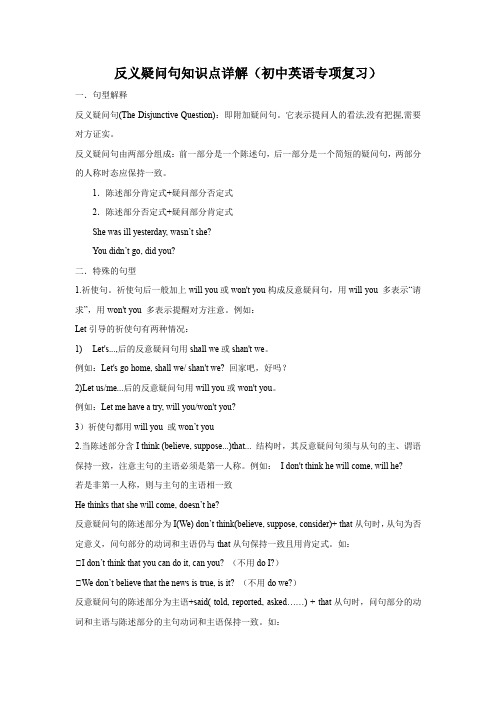
反义疑问句知识点详解(初中英语专项复习)一.句型解释反义疑问句(The Disjunctive Question):即附加疑问句。
它表示提问人的看法,没有把握,需要对方证实。
反义疑问句由两部分组成:前一部分是一个陈述句,后一部分是一个简短的疑问句,两部分的人称时态应保持一致。
1.陈述部分肯定式+疑问部分否定式2.陈述部分否定式+疑问部分肯定式She was ill yesterday, wasn’t she?You didn’t go, did you?二.特殊的句型1.祈使句。
祈使句后一般加上will you或won't you构成反意疑问句,用will you 多表示“请求”,用won't you 多表示提醒对方注意。
例如:Let引导的祈使句有两种情况:1)Let's...,后的反意疑问句用shall we或shan't we。
例如:Let's go home, shall we/ shan't we? 回家吧,好吗?2)Let us/me...后的反意疑问句用will you或won't you。
例如:Let me have a try, will you/won't you?3)祈使句都用will you 或won’t you2.当陈述部分含I think (believe, suppose...)that... 结构时,其反意疑问句须与从句的主、谓语保持一致,注意主句的主语必须是第一人称。
例如:I don't think he will come, will he?若是非第一人称,则与主句的主语相一致He thinks that she will come, doesn’t he?反意疑问句的陈述部分为I(We) don’t think(believe, suppose, consider)+ that从句时,从句为否定意义,问句部分的动词和主语仍与that从句保持一致且用肯定式。
初中英语反意疑问句专项语法讲解

初中英语反意疑问句专项语法讲解反意疑问句是由两部分组成的,前一部分是对事物的陈述(即陈述句),后一部分是简短的提问(即简短疑问句),中间用逗号隔开。
如果前一部分用肯定句,后一部分就用否定疑问句;如果前一部分用否定句,后一部分就用肯定疑问句。
反意疑问句的回答,不管问题的提法如何,若客观事实是肯定的,就要用yes,事实是否定的,就要用no.一、含be(is, are, was, were)动词的反意疑问句其句型是:句型1:主语+ be+其它,isn’t(aren’t, wasn’t, weren’t)+ 主语?句型2:主语+ be not+其它,is(are, was, were) + 主语?① You are from America, aren’t you? Yes, I am. No, I’m not.② It isn’t very cold today, is it? Yes, it is. No, it isn’t.③ Tom was away yesterday, wasn’t he? Yes, he was. No, he wasn’t.④ The Green weren’t at home last night, were they?Yes, they were. No, they weren’t.⑤ Mary is reading English now, isn’t she? Yes, she is. No, she isn’t.⑥ Your parents aren’t going to have a party this Sunday, are they?Yes, they are. No, they aren’t.⑦ The girls were singing when the teacher came in, weren’t they?Yes, they were. No, they weren’t.注意:There be句型① There is an old picture on the wall, isn’t there?Yes, there is. No, there isn’t.②There aren’t any children in the room, are there?Yes, there are. No, there aren’t.③ There wasn’t a telephone call for me, was there?Yes, there was. No, there wasn’t.④ There were enough people to pick apples, weren’t there?Yes, there wer e. No there weren’t.二、行为动词的一般现在时的反意疑问句其句型是:句型1: 主语+动词原形+其它,don’t I(you, we, they)?句型2: 主语+ don’t+动词原形+其它,do I(you, we, they)?句型3: 主语+动词第三人称单数+其它,doesn’t he(she, it)?句型4: 主语+ doesn’t+动词原形+其它,does he(she, it)?① You often watch TV in the evening, don’t you? Yes, I do. No, I don’t.② The students don’t study hard, do they? Yes, they do. No, they don’t.③ Mary studies Chinese hard, doesn’t she? Yes, she does. No, she doesn’t.④ The boy doesn’t often go to school b y bike, does he?Yes, he does. No, he doesn’t.⑤ The first class begins at eight, doesn’t it? Yes, it does. No, it doesn’t.三、行为动词的一般过去时的反意疑问句其句型是:句型1: 主语+动词过去式+其它,didn’t+主语?句型2: 主语+didn’t+动词原形+其它,did +主语?① You watched TV last night, didn’t you? Yes, I did. No, I didn’t.② Jim’s parents didn’t go to Hong Kong last month, did they?Yes, they did. No, they didn’t.③ The rain stopped, didn’t it? Yes, it did. No, it didn’t.④ Mr. Clarke didn’t buy a car, didn’t he? Yes, he did. No, he didn’t.四、一般将来时的反意疑问句其句型是:句型1: 主语+will+动词原形+其它,won’t+主语?句型2: 主语+ won’t +动词原形+其它,will +主语?① The boys will play games, won’t they? Yes, they will. No, they won’t.② It won’t stop raining, will it? Yes, it will.No, it won’t.③ Mr. Smith will visit our school next week, won’t he? Yes, he will. No, he won’t.注意:There be句型的一般将来时① There will be a basketball match tomorrow, won’t there?Yes, there will. No, there won’t.② There won’t be too much pol lution in the future, will there?Yes, there will. No, there won’t.五、现在完成时的反意疑问句其句型是:句型1: 主语+have+动词过去分词+其它,haven’t+主语?句型2: 主语+ haven’t +动词过去分词+其它,have +主语?句型3: 主语+has+动词过去分词+其它,hasn’t+主语?句型4: 主语+ has n’t +动词过去分词+其它,has +主语?① You have been to Shanghai before, haven’t you? Yes I have. No, I haven’t.② You haven’t been to Shanghai before, have you? Yes I have. No, I haven’t.③ Jack has done his homework, hasn’t he? Yes, he has. No, he hasn’t.④ Jack hasn’t done his homework, has he? Yes, he has. No, he hasn’t.六、现在完成进行时的反意疑问句其句型是:句型1: 主语+have been+动词现在分词+其它,haven’t+主语?句型2: 主语+ haven’t been +动词现在分词+其它,have +主语?句型3: 主语+has been +动词现在分词+其它,hasn’t+主语?句型4: 主语+ hasn’t been +动词现在分词+其它,has +主语?① You have been skating for five hours, haven’t you? Yes, I have. No, I haven’t.② You haven’t been skating for five hours, have you? Yes, I have. No, I haven’t.③ Bob has been collecting kites since 1999, hasn’t h e? Yes, he has. No, he hasn’t.④ Bob hasn’t been collecting kites since 1999, has he? Yes, he has. No, he hasn’t.七、含有情态动词的反意疑问句其句型是:句型1: 主语+情态动词+动词原形+其它,情态动词否定形式+主语?句型2: 主语+情态动词否定形式+动词原形+其它,情态动词+主语?① You can speak French, can’t you?Yes, I can. No, I can’t.② They can’t understand me, can they? Yes, they can. No, they can’t.③ Ann could swim when she was six, couldn’t she? Yes, she could. No, she couldn’t.④ The students must study hard, mustn’t they? Yes, they must. No, they needn’t.注意:You must go home now, needn’t you? Yes, I must. No, I needn’t.★ 值得注意的是有时英语的谓语动词并不用否定式(即没加上not),而是用上了“never, little, few, hardly, nothing, nobody”等词,这时该陈述句也属于否定句,因此,反意疑问句的后半部分应用肯定疑问式。
初中英语反义疑问句详细讲解整合

反义疑问句一、英文中的反意疑问句。
1、什么是反意疑问句英语中,反意疑问句是由陈述句和附在其后的附加疑问句组成。
其中附加疑问句是对陈述句所说的事实或观点提出疑问,起证实作用,一般用于证实说话者所说的事实或观点。
(表示说话者对某事有一定看法,但又不完全确定,需要对方加以证实。
)翻译为“是吗”2.反意疑问句的回答,回答时,如果情况属实,用Yes加上反问句的倒装肯定句;若果情况不属实,则用No加上反问句的倒装否定句。
例如Youweremovedbyyourstudents,weren’tyou?情况属实:Yes,Iwere.?was情况不属实:No,Iweren’t.注意事项:附加问句的主语应与陈述句的主语保持一致,且只能用人称代词替代。
如:YoucomefromBeijing,don'tyou?你来自北京,是不是?ThestudentsinGradeOnewon'tgotothepark,willthey?一年级的学生不去公园了,是吗?二、反意疑问句中问句部分的动词与陈述部分的动词在语气上成相反的对应关系,即:肯定+否定?否定+肯定?如:Youcan’tdoit,canyou?你不能做它,是吗?Theyareverylateforthemeeting,aren’tthey?他们开会迟到了,是吗?三.当陈述句中含有be动词,助动词,或是情态动词时,反问句部分由这些词加上主语人称代词构成,Be动词包括:am,is,are,was,were助动词有:do,does,did,have(用在完成时),has(用在完成时)等情态动词有:can,could,may,might,must,will,would,shall,shoul例如:Sheisalovelygirl,isn’tshe?她是一个可爱的女孩,是吗?Hewillgohome,won’the?他要回家了,是吗?Shedoesn’tilketoeatpopcorn,doesshe?她不喜欢吃爆米花,是吗?Thebabywon’tsleepearly,willit?小宝宝睡得不早,是吗?注意:Hehassupperathomeeveryday,doesn’t he?(不能用hasn’the?)他每天在家吃晚饭,是吗?Theyhaveknownthematter,haven’tthey?(不能用don’tthey?)他们已经知道那事情了,是吗?四.当陈述句中只含有行为动词时,若动词加了s,就用does,若动词为原形,就用do,动词为过去式,则用did,例如:Youcleanedyourhouselastweek,didn’tyou?你上周打扫了你的房间,是吗?Yourfatherplaysthecomputerverywell,doesn’the?你父亲电脑技术很好,是吗?Theylooksohappytoday,don’tthey?你今天看起来很高兴,是吗?五.(1)反意疑问句的陈述部分带有little,few,never,hardly,seldom,nobody,nothing,noone,none, neither,barely,scarcely等否定意义的词时,问句部分用肯定式。
反义疑问句(最全)知识讲解
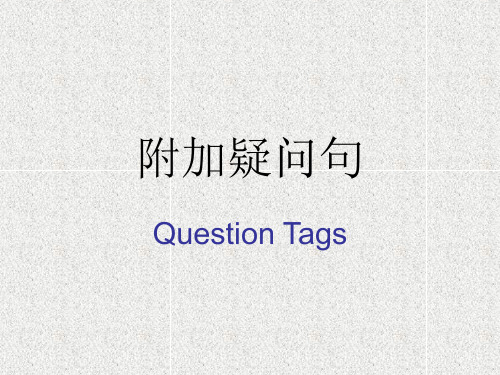
四、有情态动词的反义疑问句:
1.带情态动词dare或need的反意疑问句,疑问部分常 用 need (dare ) +主语。 We need not do it again, need we ? He dare not say so, dare he? 当dare, need 为实义动词时,疑问部分用助动词do + 主语。
D.must表示推测 ,其疑问部分必须与must 后面的主要 动词相呼应 ①对现在动作或存在的情况的推测(don’t +主语) You must know the answer to the exercise, don’t you? ②对过去发生的动作或存在的情况的推测有两种情况:
a 表示肯定推测 (一)句中陈述部分没有表示过去的时间状语,这时疑问 部分中的动词就用现在完成时。 (haven’t / hasn’t + 主语) You must have told her about it, haven’t you?
5.陈述部分有would rather +v.,疑问部分多用 wouldn’t +主语。 He would rather read it ten times than recite it,
wouldn’t he? 6.陈述部分有you’d like to +v. 疑问部分用wouldn’t + 主语。
三、一些特殊结构的反义疑问句:
1.含有ought to 的反意疑问句,陈述部分是肯定的,疑 问部分用shouldn’t / oughtn’t +主语。 He ought to know what to do, oughtn’t he? / shouldn’t he? 2.陈述部分有have to +v. (had to + v.),疑问部分常用 don’t +主语(didn’t +主语)。 We have to get there at eight tomorrow, don’t we? 3.陈述部分的谓语是used to 时,疑问部分用didn’t +主 语或 usedn’t +主语。 He used to take pictures there, didn’t he? / usedn’t he? 4.陈述部分有had better + v. 疑问句部分用hadn’t you? You’d better read it by yourself, hadn’t you?
初中反义疑问句详细讲解

反义疑问句一、1、什么是反意疑问句英语中,反意疑问句是由陈述句和附在其后的附加疑问句组成。
其中附加疑问句是对陈述句所说的事实或观点提出疑问,起证实作用,一般用于证实说话者所说的事实或观点。
翻译为“是吗”2.反意疑问句的回答,回答时,如果情况属实,用Yes加上反问句的倒装肯定句;若果情况不属实,则用No加上反问句的倒装否定句。
例如You were moved by your students, weren’t you?情况属实:Yes, I were.情况不属实:No, I weren’t.二、反意疑问句中问句部分的动词与陈述部分的动词在语气上成相反的对应关系,即:肯定+否定?否定+肯定?如:①You can’t do it, can you?你不能做它,是吗?②They are very late for the meeting, aren’t they?他们开会迟到了,是吗?三.当陈述句中含有be动词,助动词,或是情态动词时,反问句部分由这些词加上主语人称代词构成,Be动词包括:am, is, are, was, were助动词有:do, does, did, have(用在完成时), has(用在完成时)等情态动词有:can, could, may, might, must, will, would, shall, should例如:She is a lovely girl, isn’t she?她是一个可爱的女孩,是吗?He will go home, __won’t__ __he__?他要回家了,是吗?She doesn’t l ike to eat popcorn, __does__ _she___?她不喜欢吃爆米花,是吗?The baby won’t sleep early, will it?小宝宝睡得不早,是吗?注意:①He has supper at home every day,doesn’t’t he? (不能用hasn’t he?) 他每天在家吃晚饭,是吗?②They have known the matter, haven’t they? (不能用don’t they?)他们已经知道那事情了,是吗?四.当陈述句中只含有行为动词时,若动词加了s,就用does, 若动词为原形,就用do,动词为过去式,则用did,例如:You cleaned your house last week, _didn’t___ __you__?你上周打扫了你的房间,是吗?Your father plays the computer very well, __doesn’t__ ___he _?你父亲电脑技术很好,是吗?They look so happy today, _don’t ___ _they___?你今天看起来很高兴,是吗?五.反意疑问句的陈述部分带有little, few, never, hardly, seldom,nobody, nothing,barely, scarcely等否定意义的词时,问句部分用肯定式。
初中反义疑问句专题讲解

初中反义疑问句专题讲解反义疑问句1.基本用法和结构反意疑问句由“陈述句+简略疑问句”两部分组成,第一部分提出一种看法,第二部分用来质疑或表示证实。
陈述部分和问题部分的动词时态和动词性质应一致,积极形式和消极形式相互对立,即陈述部分为积极时,问题部分使用消极形式,陈述部分为消极时,问题部分使用积极形式:helikesenglish,doesn’the?他喜欢英语,是吗?hedoesn’tlikeenglish,doeshe?他不喜欢英语,是吗?【注】1.如果陈述部分包含否定词或半否定词,如hard、never、level、nothing、little、nobody、level等,则问题部分应为肯定:hehasfewfriendshere,hashe?他在这儿几乎没什么朋友,是吗?shesaidnothing,didshe?她什么也没说,是不是?2.若陈述部分含有带否定前缀的词,疑问部分仍用否定式:itisunfair,isn’tit?这不公平,不是吗?itisimpossible,isn’tit?那是不可能的,是吗?3.当陈述部分在那里时,问题部分仍然使用那里作为“主题”:那里没有任何东西,是在这里吗?房间里什么都没有,是吗?4.当陈述部分的主语是指示代词(this,that,this,that)时,疑问部分使用it等代词,它们:thatisanewcar,isn’tit?这是一辆新汽车,是吗?5.当陈述部分的主语是复合不定代词时,如果陈述部分的主语是复合不定代词,如someone、someone、everyone、everyone、none和nobody,反义词问题的主语是他在正式文体中,他们:没人迟到,是吗?没有人迟到,是吗?6.当陈述部分的主语是something,anything,nothing,everything等复合不定代词时,其反意疑问句的主语要用it:一切都准备好了,不是吗?一切都准备好了吗?没什么重要的,对吗?没关系吧?拓展模块三、陈述句是祈使句的反义词问句3.当祈使句为letus…时,若表示请求,疑问部分用willyou,若表示建议,疑问部分用shallwe:让我们知道你的地址,好吗?你能告诉我们你的地址吗?让我们一起去温网,好吗?我们一起去游泳好吗?4、陈述句是主从复合句的反义词问句1.当陈述部分为主从复合句时,疑问部分一般应与主句保持一致:shesaidthathedidn’tlikeit,didn’tshe?她说他不喜欢它,是不是?heknowswhereilive,doesn’the?他知道我住什么地方,是不是?2.当陈述部分为ithink(believe,suppose)that...等时,疑问部分通常与从句保持一致(注意否定的转移):1.当陈述部分是我。
初中英语反义疑问句的用法归纳

初一反义疑问句【反义疑问句】〔一〕概念: 反意疑问句是由陈述句和附在其后的附加疑问句组成。
其中附加疑问句是对陈述句所说的事实或观点提出疑问, 起证实作用, 一般用于证实说话者所说的事实或观点。
〔二〕要点注意:1.反意疑问句前后两局部谓语应是: “肯定陈述+否认疑问〞或“否认陈述+肯定疑问〞。
2.简单问句如果是否认式: not应与be, do, will等系动词、助动词、情态动词缩写。
3.简单问句的主语不用名词, 应用人称代词。
4、陈述局部含“too...to〞时, 是否认句。
〔三〕用法:1) 陈述局部I am时, 疑问局部要用aren't I.I'm as tall as your sister, aren't I" 〔我和你姐姐一样高, 对吗?〕2) 陈述局部用no, nothing, nobody, never, few, little, seldom, hardly等否认含义的词时, 疑问局部用肯定含义。
如:The old man made no answer, did he"Jim is never late for school, is he"3) 陈述局部有情态动词have to +v.(had to + v.), 疑问局部常用don't +主语〔didn't +主语〕。
We have to get there at eight tomorrow, don't we"used to, 疑问局部用didn't +主语或usedn't +主语。
He used to take pictures there, didn't he" / usedn't he"had better〔最好〕+ v.疑问句局部用hadn't you"You'd better read it by yourself, hadn't you"4) 陈述局部有would rather〔宁可、宁愿〕+v., 疑问局部多用wouldn't +主语。
反义疑问句讲解及答案

反义疑问句一.句型解释反义疑问句(The Disjunctive Question):即附加疑问句。
它表示提问人的看法,没有把握,需要对方证实。
反义疑问句由两部分组成:前一部分是一个陈述句,后一部分是一个简短的疑问句,两部分的人称时态应保持一致。
1.陈述部分肯定式+疑问部分否定式2.陈述部分否定式+疑问部分肯定式She was ill yesterday, wasn’t she?You didn’t go, did you?二.特殊的句型1.祈使句。
祈使句后一般加上will you或won't you构成反意疑问句,用will you 多表示“请求”,用won't you 多表示提醒对方注意。
例如:Let引导的祈使句有两种情况:1) Let's...,后的反意疑问句用shall we或shan't we。
例如:Let's go home, shall we/ shan't we? 回家吧,好吗?2)Let us/me...后的反意疑问句用will you或won't you。
例如:Let me have a try, will you/won't you?3)祈使句都用will you 或won’t you2.当陈述部分含I think (believe, suppose...)that... 结构时,其反意疑问句须与从句的主、谓语保持一致,注意主句的主语必须是第一人称。
例如:I don't think he will come, will he?若是非第一人称,则与主句的主语相一致He thinks that she will come, doesn’t he?反意疑问句的陈述部分为I(We) don’t think(believe, suppose, consider)+ that从句时,从句为否定意义,问句部分的动词和主语仍与that从句保持一致且用肯定式。
初中反义疑问句详解及练习和答案
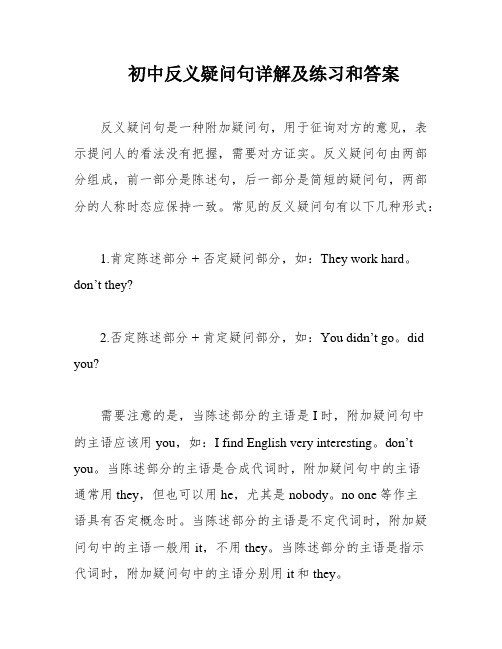
初中反义疑问句详解及练习和答案反义疑问句是一种附加疑问句,用于征询对方的意见,表示提问人的看法没有把握,需要对方证实。
反义疑问句由两部分组成,前一部分是陈述句,后一部分是简短的疑问句,两部分的人称时态应保持一致。
常见的反义疑问句有以下几种形式:1.肯定陈述部分 + 否定疑问部分,如:They work hard。
don’t they?2.否定陈述部分 + 肯定疑问部分,如:You didn’t go。
did you?需要注意的是,当陈述部分的主语是I时,附加疑问句中的主语应该用you,如:I find English very interesting。
don’t you。
当陈述部分的主语是合成代词时,附加疑问句中的主语通常用they,但也可以用he,尤其是nobody。
no one等作主语具有否定概念时。
当陈述部分的主语是不定代词时,附加疑问句中的主语一般用it,不用they。
当陈述部分的主语是指示代词时,附加疑问句中的主语分别用it和they。
5.在正式场合,如果陈述部分以代词one作主语,附加疑问句中的主语也应该用one。
在非正式场合,可以用you或he 代替。
例如:One should always be careful。
shouldn’t one。
或者 can you?One must fulfill his duty。
mustn’t he?6.如果陈述部分用I’m…结构,附加疑问部分一般用aren’t I。
例如:I am feeling good today。
aren’t I?7.当陈述句为there be结构时,附加疑问句中的主语也应该用there。
例如:There’s no way to f ix it。
is there?There’s something strange here。
XXX?8.当陈述部分带有seldom。
hardly。
never。
rarely。
few。
little。
反义疑问句的用法归纳及回答举例初中

反义疑问句的用法归纳及回答举例初中
摘要:
一、反义疑问句的用法归纳
1.反义疑问句的构成
2.反义疑问句的回答方式
3.反义疑问句的注意事项
二、反义疑问句的回答举例
1.肯定回答举例
2.否定回答举例
正文:
一、反义疑问句的用法归纳
1.反义疑问句的构成
反义疑问句通常由两部分组成:一个陈述句和一个简短的疑问句。
陈述句和疑问句之间通常有一个逗号分隔,而且疑问句部分常常以“难道不是吗?”等反问语气词结尾。
例如:“你不喜欢吃苹果,难道不是吗?”
2.反义疑问句的回答方式
当反义疑问句用于询问对方意见时,回答时要根据事实情况给出肯定或否定的回答。
如果事实情况与陈述句一致,回答为肯定;如果事实情况与陈述句相反,回答为否定。
例如,对于“你不喜欢吃苹果,难道不是吗?”这个问题,如果对方确实不喜欢吃苹果,回答应该是“是的,我不喜欢。
”
3.反义疑问句的注意事项
在使用反义疑问句时,要注意陈述句和疑问句的一致性。
如果陈述句是肯定形式,疑问句部分也应该是肯定形式;如果陈述句是否定形式,疑问句部分也应该是否定形式。
此外,反义疑问句通常用于表示对某事不确定或想要得到对方确认的情况下,所以要根据实际情况适当使用。
二、反义疑问句的回答举例
1.肯定回答举例
张三问:“你不喜欢吃苹果,难道不是吗?”
李四回答:“是的,我不喜欢。
”
2.否定回答举例
张三问:“你不喜欢吃苹果,难道不是吗?”
李四回答:“不,我喜欢吃苹果。
初中英语反意疑问句专项讲解
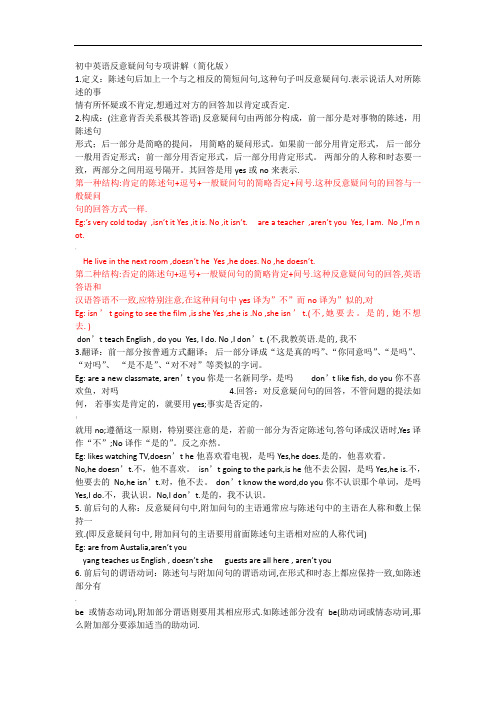
初中英语反意疑问句专项讲解(简化版)1.定义:陈述句后加上一个与之相反的简短问句,这种句子叫反意疑问句.表示说话人对所陈述的事情有所怀疑或不肯定,想通过对方的回答加以肯定或否定.2.构成:(注意肯否关系极其答语) 反意疑问句由两部分构成,前一部分是对事物的陈述,用陈述句形式;后一部分是简略的提问,用简略的疑问形式。
如果前一部分用肯定形式,后一部分一般用否定形式;前一部分用否定形式,后一部分用肯定形式。
两部分的人称和时态要一致,两部分之间用逗号隔开。
其回答是用yes或no来表示.第一种结构:肯定的陈述句+逗号+一般疑问句的简略否定+问号.这种反意疑问句的回答与一般疑问句的回答方式一样.Eg:’s very cold today ,isn’t it Yes ,it is. No ,it isn’t. are a teacher ,aren’t you Yes, I am. No ,I’m n ot.-He live in the next room ,doesn’t he Yes ,he does. No ,he doesn’t.第二种结构:否定的陈述句+逗号+一般疑问句的简略肯定+问号.这种反意疑问句的回答,英语答语和汉语答语不一致,应特别注意,在这种问句中yes译为”不”而no译为”似的,对Eg: isn’t going to see the film ,is she Yes ,she is .No ,she isn’t.(不,她要去。
是的, 她不想去. )don’t teach English , do you Yes, I do. No ,I don’t. (不,我教英语.是的, 我不3.翻译:前一部分按普通方式翻译;后一部分译成“这是真的吗”、“你同意吗”、“是吗”、“对吗”、“是不是”、“对不对”等类似的字词。
Eg: are a new classmate, aren’t you 你是一名新同学,是吗 don’t like fish, do you你不喜欢鱼,对吗 4.回答:对反意疑问句的回答,不管问题的提法如何,若事实是肯定的,就要用yes;事实是否定的,)就用no;遵循这一原则,特别要注意的是,若前一部分为否定陈述句,答句译成汉语时,Yes译作“不”;No译作“是的”。
反意疑问句详解(初中)
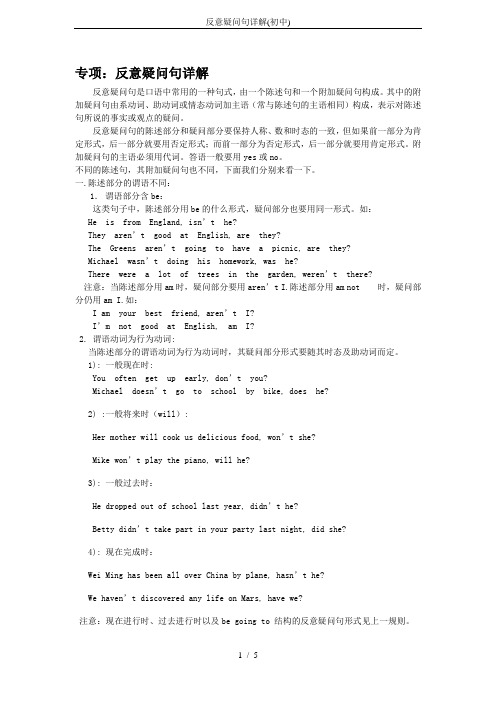
专项:反意疑问句详解反意疑问句是口语中常用的一种句式,由一个陈述句和一个附加疑问句构成。
其中的附加疑问句由系动词、助动词或情态动词加主语(常与陈述句的主语相同)构成,表示对陈述句所说的事实或观点的疑问。
反意疑问句的陈述部分和疑问部分要保持人称、数和时态的一致,但如果前一部分为肯定形式,后一部分就要用否定形式;而前一部分为否定形式,后一部分就要用肯定形式。
附加疑问句的主语必须用代词。
答语一般要用yes或no。
不同的陈述句,其附加疑问句也不同,下面我们分别来看一下。
一.陈述部分的谓语不同:1.谓语部分含be:这类句子中,陈述部分用be的什么形式,疑问部分也要用同一形式。
如:He is from England, isn’t he?They aren’t good at English,are they?The Greens aren’t going to have a picnic, are they?Michael wasn’t doing his homework, was he?There were a lot of trees in the garden, weren’t there?注意:当陈述部分用am时,疑问部分要用aren’t I.陈述部分用am not 时,疑问部分仍用am I.如:I am your best friend, aren’t I?I’m not good at English, am I?2.谓语动词为行为动词:当陈述部分的谓语动词为行为动词时,其疑问部分形式要随其时态及助动词而定。
1): 一般现在时:You often get up early, don’t you?Michael doesn’t go to school by bike, does he?2) :一般将来时(will):Her mother will cook us delicious food, wo n’t she?Mike won’t play the piano, will he?3): 一般过去时:He dropped out of school last year, didn’t he?Betty didn’t take part in your party last night, did she?4): 现在完成时:Wei Ming has been all over China by plane, hasn’t he?We haven’t discovered any life on Mars,have we?注意:现在进行时、过去进行时以及be going to 结构的反意疑问句形式见上一规则。
- 1、下载文档前请自行甄别文档内容的完整性,平台不提供额外的编辑、内容补充、找答案等附加服务。
- 2、"仅部分预览"的文档,不可在线预览部分如存在完整性等问题,可反馈申请退款(可完整预览的文档不适用该条件!)。
- 3、如文档侵犯您的权益,请联系客服反馈,我们会尽快为您处理(人工客服工作时间:9:00-18:30)。
反义疑问句
知识点梳理
一、基本用法与结构
反意疑问句由“陈述句+简略疑问句”两部分组成,第一部分提出一种看法,第二部分用来质疑或表示证实。
陈述部分与疑问部分的动词时态和动词性质应保持一致,而且肯定和否定形式彼此相反,即陈述部分为肯定式时,疑问部分用否定式,陈述部分为否定式时,疑问部分用肯定式:
He likes English, doesn’t he? 他喜欢英语,是吗?
He doesn’t like English, does he? 他不喜欢英语,是吗?
【注】
1. 若陈述部分含有hardly, never, few, nothing ,little,nobody,seldom等否定词或半否定词,其疑问部分要用肯定式:
He has few friends here, has he? 他在这儿几乎没什么朋友,是吗?
She said nothing, did she? 她什么也没说,是不是?
2. 若陈述部分含有带否定前缀的词,疑问部分仍用否定式:
It is unfair, isn’t it? 这不公平,不是吗?
It is impossible, isn’t it? 那是不可能的,是吗?
3. 当陈述部分为为there be句型时,疑问部分仍用there作“主语”:
There was nothing in the room, was there? 房间里什么也没有,是吗?
4. 当陈述部分的主语是指示代词(this ,that ,these ,those)时,疑问部分用it, they等代词:
That is a new car, isn’t it? 这是一辆新汽车,是吗?
5.当陈述部分的主语是复合不定代词时,若陈述部分的主语为somebody,someone, everyone, everybody, no one, nobody等复合不定代词,其反意疑问句的主语在正式文体中用he,在口语或非正式文体中通常用they:Nobody was late, were they? 没有一个人迟到,是吗?
6.当陈述部分的主语是something, anything, nothing, everything等复合不定代词时,其反意疑问句的主语要用it:
Everything is ready, isn’t it? 一切都准备好了吗?
Nothing is important, is it? 没有什么重要的,不是吗?
拓展模块
三、陈述部分为祈使句的反意疑问句
1. 基本原则:若陈述部分为祈使句,疑问部分通常用will you:
Please help us, wil l you? 请帮帮我们,好吗?
Come with us, will you? 同我们一起去,好吗?
Don’t forget to post the letter, will you? 请别忘了寄信。
2. 当祈使句为Le t’s…时,疑问部分总是用shall we:
Let’s go there together, shall we? 我们一起去,好吗?
3. 当祈使句为Let us…时,若表示请求,疑问部分用will you,若表示建议,疑问部分用shall we:
Let us know your address, will you? 请把你的地址告诉我们,好吗?
Let us go swimming together, shall we? 我们一起去游泳好吗?
四、陈述部分为主从复合句的反意疑问句
1. 当陈述部分为主从复合句时,疑问部分一般应与主句保持一致:
She said that he didn’t like it, didn’t she? 她说他不喜欢它,是不是?
He knows where I live, doesn’t he? 他知道我住什么地方,是不是?
2.当陈述部分为I think (believe, suppose) that...等时,疑问部分通常与从句保持一致(注意否定的转移):
I think that it is too short, i sn’t it? 我认为它太短了,对不对(它太短吗)?
I don’t think he will come, will he? 我认为他不会来,对吗(他会来吗)? 【注】这类用法主要限于主语为第一人称且think等动词为一般现在时的情形。
五、几种特殊情况的反意疑问句
1. 当陈述部分是I’m…时,疑问部分通常用aren’t I:
I’m wrong,aren’t I? 我错了,是吗?
I’m older than you, aren’t I? 我年纪比你大,对不对?
2. 当陈述部分是I wish…时,疑问部分通常用may I
I wish to go with them, may I? 我想同他们一起去,可以吗?
3. 当陈述部分有had better时,疑问部分用had:
He’d better leave here, hadn’t he? 他最好离开这儿,是吗?
基础巩固题
( ) 1. Mr. Read is interested in talk show, ___________?
A. is he
B. isn’t he
C. isn’t Mr. Read
D. doesn’t he
( ) 2. The children have never seen a plane, ___________?
A. have they
B. don’t they
C. haven’t they
D. do they
( ) 3. He wants to help you, ___________ he?
A. does
B. is
C. doesn’t
D. isn’t
( ) 4. Tom didn’t finish his homework, _____________?
A. did Tom
B. did he
C. didn’t he
D. didn’t Tom
( ) 5. There is a beautiful clock on the wall, ____________?
A. isn’t there
B. is there
C. i sn’t it
D. is it
( ) 6. He said nothing at the meeting, ___________ he?
A. did
B. had
C. didn’t
D. hadn’t
( ) 7. Dad read the e-mail from his friend just now, ___________?
A. didn’t he
B. doesn’t he
C. w asn’t he
D. was he
( ) 8. –Wei Fang doesn’t know Russian, does she?
–___________, she has not learned Russian.
A. No, she doesn’t
B. Yes, she doesn’t
C. Yes, she does
D. No, she does
( ) 9. The students are all ready, ___________?
A. aren’t the students
B. are they
C. aren’t they
D. are the students ( ) 10. This book cost her twenty Yuan, _____________?
A. didn’t it
B. doesn’t it
C. did it
D. does it
中考链接
( ) 1. Tom hasn’t come yet. He won’t be late, __________?
A. will he
B. is he
C. won’t he
D. isn’t he
( ) 2. There is little milk in the bottle, ____________?
A. isn’t it
B. is it
C. isn’t there
D. is there
( ) 3. I don’t think Ken did such a stupid thing, _________?
A. do I
B. did I
C. did he
D. does he ( ) 4. E-mail is very popular today. People seldom write letters now, _____?
A. did they
B. do they
C. didn’t they
D. don’t they。
